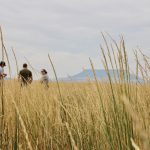
Tag Archives Plant breeding

Gene editing’s growing sway in plant breeding
Crop variety development in Canada is evolving to incorporate gene editing more as a breeding tool; one researcher notes that Canada’s regulatory approach will help drive innovation

Plant breeding picks up the pace
Thirteen years of breeding and production can now be done in five

How scientific minds changed toward perennial grains
Early boosters were voices on the fringe: Today, perennial crops are sought by researchers worldwide — including Manitoba

Filling in the genetic road map for better barley
AAFC has announced the first completed reference genome for a Canadian malt barley variety, and researchers say it’s the first step towards quicker, better breeding selection

Opinion: Plant-breeding innovations fuel future
This new technology can help solve some of the biggest challenges of tomorrow

Bibeau says government committed to federal plant breeding
Seed royalty consultations stalled

Reporter’s Take: Farmer-owned AAFC?

AAFC sits on value creation sidelines
In the meantime farmers and the seed industry are seeking consensus on how to proceed

USDA limits review requirements of some biotech farm products

Kernza plant breeder recognized
Faces of Ag: Doug Cattani has spent his career working on perennial grasses




